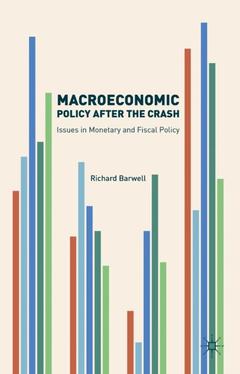Macroeconomic Policy after the Crash , 1st ed. 2016 Issues in Monetary and Fiscal Policy
Auteur : Barwell Richard

This book reviews the key policy debates during the post-crash era, describing the issues that policymakers grappled with, the decisions that they took and the details of the policy instruments that were created. Focusing specifically on issues in monetary and fiscal policy, chapters demonstrate that very little that was done during this period conformed to the simple textbook treatment of macroeconomic policy: central banks cutting policy rates or finance ministers cutting the rate of income tax. The author guides the reader through the revolution in the conduct of macroeconomic policy in an engaging and approachable manner, and illuminates the key innovations in the toolkit and themes in the debate over past years with great detail, from negative rates to quantitative easing, and from austerity versus financial repression, restructuring and default to productivity puzzles and deflation.
Part 1) Monetary Policy.- Chapter 1) The Lower Bound: the zero and beyond.- Chapter 2) Quantitative Easing: bond buying to the rescue.- Chapter 3) Deflation: the dog that didn’t bark.- Chapter 4) The Productivity Puzzle.- Chapter 5) Loose Talk: guiding interest rate expectations lower.- Chapter 6) Importing Disinflation.- Chapter 7) Low For Much, Much Longer: postponing lift-off from the lower bound.- Part 2) Fiscal Policy.- Chapter 1) Fiscal Arithmetic.- Chapter 2) Objectives.- Chapter 3) The Fiscal Multiplier.- Chapter 4) Monetary Dominance.- Chapter 5) When Bond Markets Attack.- Chapter 6) Repair, Restructure, Repress or Reach for the Printing Press.- Chapter 7) The Institutions of Fiscal Policy.
Richard Barwell is an economist at BNP Paribas Investment Partners in London. Prior to that, he worked at the Royal Bank of Scotland (RBS), having earlier spent almost a decade at the Bank of England, working on issues of monetary and financial stability. He has a PhD from the London School of Economics, UK, and is the author of Macroprudential Policy: Taming the wild gyrations of credit flows, debt stocks and asset prices (Palgrave Macmillan, 2013).
Provides detailed background and analysis of the revolution of macroeconomic policy
Offers particular emphasis on the impact of macroeconomic policy changes in the UK
Explores policy debates, economic tools and policy instruments of the post-crash era in an approachable manner
Features the insight of the author’s lifetime of industry experience
Date de parution : 03-2017
Ouvrage de 477 p.
15.5x23.5 cm
Disponible chez l'éditeur (délai d'approvisionnement : 15 jours).
Prix indicatif 79,11 €
Ajouter au panier


